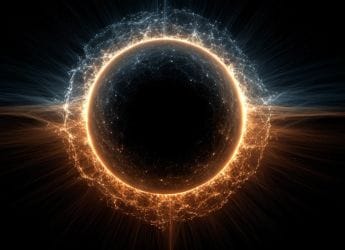- Home
- Science
- Science News
- Supermassive Black Holes Might Be Responsible for the Death of a Galaxy, Says Study
Supermassive Black Holes Might Be Responsible for the Death of a Galaxy, Says Study
Recent research has shed light on how the birth and death of a galaxy, also known as galactic cycle occurs.

Photo Credit: Unplash/ Javier Miranda
Study found that the supermassive black hole’s mass can impact the amount of cold gas in its host galaxy
Supermassive black holes might be influencing galactic star formation and triggering the death of galaxies, claims a new study. Recent research has shed light on how the birth and death of a galaxy, also known as the galactic cycle occurs. This study reveals that the mass of a supermassive black hole can significantly impact the amount of cold gas available in its host galaxy, a key component for star formation. The connection between these black holes and the suppression of star formation provides a clearer understanding of how galaxies transition from active star-birthing regions to "quiet" ones.
Black Holes and Galactic Death
Supermassive black holes, residing at the centre of large galaxies, are now believed to have a critical role in suppressing star formation. Scientists have observed that galaxies with more massive black holes tend to have reduced levels of cold gas. This gas is essential for forming new stars, and its depletion can lead to a galaxy's transition to a more passive state, where star formation significantly slows or stops. Tao Wang and his team from Nanjing University have linked the mass of these black holes with the reduced gas content in their host galaxies, in a study published in the Nature journal.
Evidence and Theories
The research indicates that more massive black holes are associated with lower amounts of cold atomic hydrogen gas. This gas, which is crucial for star formation, appears to diminish as the black hole's mass increases. This phenomenon aligns with observations of passive galaxies, which generally show reduced star-forming activity and gas reservoirs. The study suggests that supermassive black holes may either eject this gas from galaxies or prevent them from acquiring new gas from intergalactic space.
Future Research Directions
The findings challenge previous theories which had not definitively linked black hole mass with the reduction in star-forming gas. Further research is needed to explore the mechanisms through which black holes affect their host galaxies. The team plans to investigate how dense molecular gas—another critical component for star formation—correlates with black hole mass. This future work, potentially using the ALMA observatory, aims to provide deeper insights into the impact of black holes on galactic evolution.
By examining the relationship between supermassive black holes and galaxy gas reservoirs, this study opens new avenues for understanding how galaxies evolve and cease to form new stars.
Catch the latest from the Consumer Electronics Show on Gadgets 360, at our CES 2026 hub.
Related Stories
- Samsung Galaxy Unpacked 2025
- ChatGPT
- Redmi Note 14 Pro+
- iPhone 16
- Apple Vision Pro
- Oneplus 12
- OnePlus Nord CE 3 Lite 5G
- iPhone 13
- Xiaomi 14 Pro
- Oppo Find N3
- Tecno Spark Go (2023)
- Realme V30
- Best Phones Under 25000
- Samsung Galaxy S24 Series
- Cryptocurrency
- iQoo 12
- Samsung Galaxy S24 Ultra
- Giottus
- Samsung Galaxy Z Flip 5
- Apple 'Scary Fast'
- Housefull 5
- GoPro Hero 12 Black Review
- Invincible Season 2
- JioGlass
- HD Ready TV
- Laptop Under 50000
- Smartwatch Under 10000
- Latest Mobile Phones
- Compare Phones
- Red Magic 11 Air
- Honor Magic 8 RSR Porsche Design
- Honor Magic 8 Pro Air
- Infinix Note Edge
- Lava Blaze Duo 3
- Tecno Spark Go 3
- iQOO Z11 Turbo
- OPPO A6c
- Lenovo Yoga Slim 7x (2025)
- Lenovo Yoga Slim 7a
- Lenovo Idea Tab Plus
- Realme Pad 3
- Moto Watch
- Garmin Quatix 8 Pro
- Haier H5E Series
- Acerpure Nitro Z Series 100-inch QLED TV
- Asus ROG Ally
- Nintendo Switch Lite
- Haier 1.6 Ton 5 Star Inverter Split AC (HSU19G-MZAID5BN-INV)
- Haier 1.6 Ton 5 Star Inverter Split AC (HSU19G-MZAIM5BN-INV)







![[Sponsored] Haier C90 OLED TV | Dolby Vision IQ, 144Hz OLED and Google TV in Action](https://www.gadgets360.com/static/mobile/images/spacer.png)









